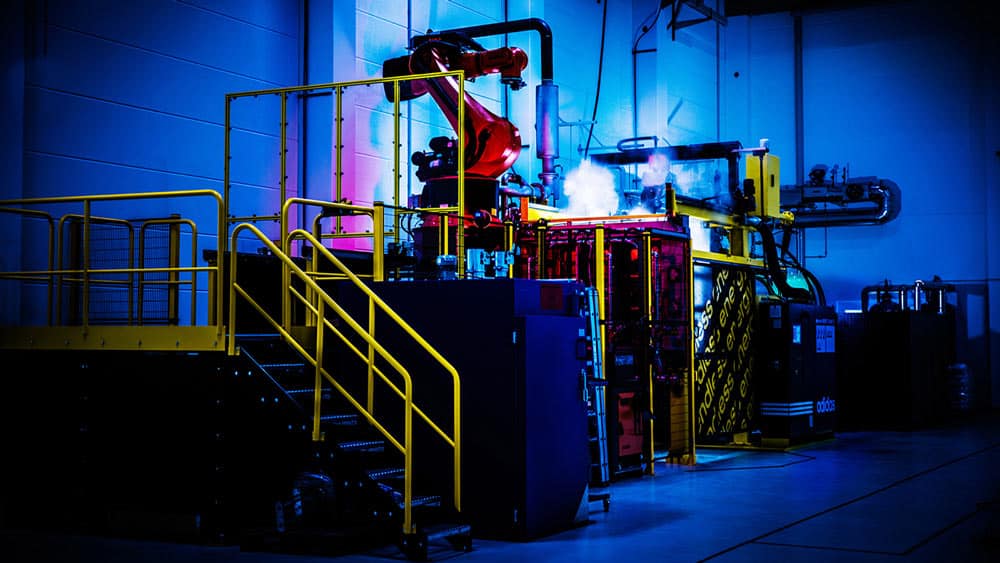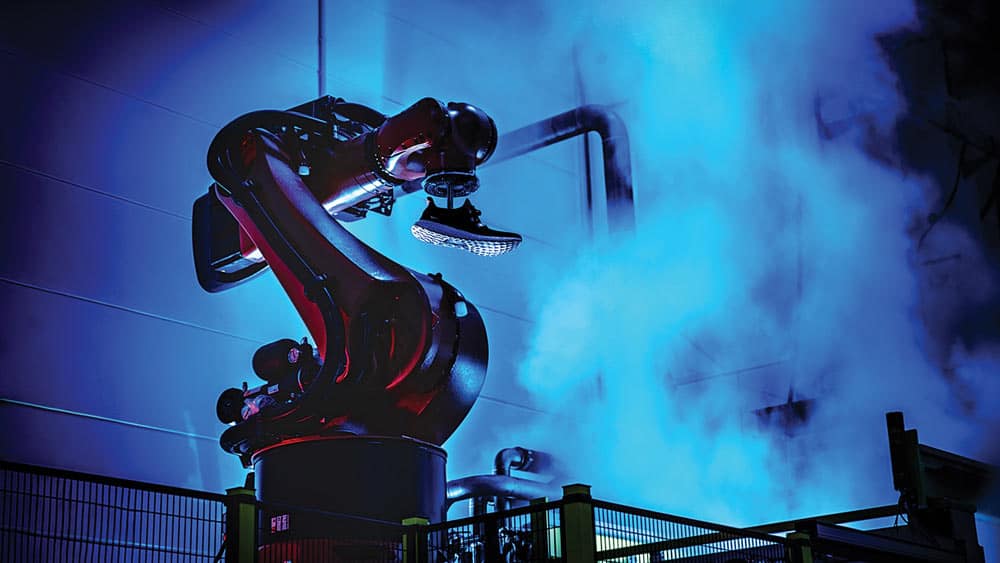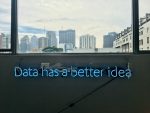The adidas SpeedFactory facility in Germany
Automation, artificial intelligence and robotics are on the march – and the talk is of job displacement and a new industrial revolution, writes Ruraidh Conlon O’Reilly.
At first glance, the Minimum Wage Machine looks like an entertaining way to idle away a Sunday in a seaside-town amusement arcade. It’s filled with pennies and equipped with a basket to catch them when they come tumbling out… but this is no slot machine.
Crank the handle for 3.892 seconds and your reward is one cent. If you have the stamina to crank it for an hour you’ll have earned €9.25 – Ireland’s minimum wage.
It’s a clever comment on modern working life in an exhibition full of them: thought-provoking experiments that raise questions about computers, robotics, artificial intelligence and the implications for the humans who created them.
Of all the themes touched upon in Trinity College Dublin’s Science Gallery, “the foremost is the future of employment and how we might deal with the changes that are underway in the way that we work,” explains William Myers, curator of Humans Need Not Apply. “Clearly there’s a lot of evidence that shows that machine learning is advancing very quickly. Many sorts of tasks that we have relied on humans to do will very soon be done by machines. So the question comes up: how do we respond to that?”
Myers’ exhibition is just one contribution in a prolific global debate that is taxing the era’s leading thinkers. The driverless car is all but guaranteed to upend how people travel and redefine our roads and cities, and its imminent arrival seems to have focused minds and sparked much reflection.
Artificial intelligence is evolving to a point whereby algorithms can cause overnight currency flash-crashes. Virtual reality headsets are already a consumer reality. The argument that we are living through another industrial revolution doesn’t seem like an exaggeration.
And just like the original industrial revolution, such rapid and uncontrollable change will generate winners and losers. Some of these concerns have a sci-fi flavour, with figures such as Microsoft founder Bill Gates and Tesla/SpaceX pioneer Elon Musk lending weight to long-standing dystopian worries about wayward robots and AI.
For Myers, the questions raised are more everyday and policy-based. “How do we reform systems of education? How might we reform taxation? Or come up with new structures like labour unions to protect workers? All are questions or topics that need to be addressed urgently.”
The inspiration for Humans Need Not Apply came from two sources. “One was that there’s this very rapid automation happening and so questions around unemployment were coming up.
There seemed to be somewhat of a consensus among experts like economists that we would adapt to these changes by ways we have done before: by inventing new jobs and that new industries would arise that we can’t even think of yet. The results of all this automation would be that we’d have more free time, we would have more opportunities to pursue creative endeavours.
“And at the same time, separately, there seemed to be this trend of artists embracing the use of machine learning and also experiments in designing algorithms or artificial intelligence to create works that are passable as art.”
These are teased out in a questioning atmosphere whereby visitors are invited to respond or form their own conclusions. But Myers has strong views that education, taxation and power-sharing need major reform in order to tackle the automation of jobs.
A LEISURE SOCIETY
On the wall of the exhibition is classical economist David Ricardo’s warning that “substitution of machinery for human labour… may render the population redundant”. One recalls John Maynard Keynes’ prediction that his grandchildren would only have to work for a few hours a week.
In fact, successive generations since the 1950s have been told that a ‘leisure society’ is achievable and that increased wealth and automation would leave them free to enjoy life without work. It has proved as elusive as Mars colonies and nuclear fusion.
And just like the original industrial revolution, such rapid and uncontrollable change will generate winners and losers
“It seems that we’ve just embraced more activity and more work, even when more conveniences and presumably more productivity have been gained,” notes Myers. “I think it’s desirable to have much more leisure time. Perhaps what will happen is that in the coming decades we’ll move into the sorts of work that, from our perspectives today will seem like leisure but to the person decades from now will very much feel like work.
“And I say that while trying to imagine what it would be like if we’d had this conversation 100 years ago, and considering what our work is like… you and I talking over digital interfaces and having the kind of jobs that we do. 100 years ago we’d look at ourselves and would be incredulous that this would qualify as work.”
BASIC INCOME
Preparing for this monumental shift is now a thorny public policy problem. Widening global inequality has led a faction of the political-minded, emblemised by the work of economist Thomas Piketty, to claim that the growing chasm between rich and poor is unsustainable – a narrative that gathered moral and popular force with the economic crash and anger against the 1%.
Similarly, the prospect of machines replacing jobs raises not just the question of how people will use their time, but how they will earn that living. For some, the time has come to put the long-standing concept of basic income, which can be traced back to philosopher Thomas Paine in 1797, into practice.
“It’s a guaranteed unconditional income for everyone in the community, without means testing or work requirements,” explains Paul O’Brien of campaign group Basic Income Ireland. “It fulfils a number of functions: one is that it means that people will be able to afford the goods that the system produces, which they may not be able to do in the future when automation takes over the jobs and relegates people to low-paid work or no work at all. From the point of view of the economic system, basic income seems essential for it to survive.”
The second major advantage is that it removes bottlenecks such as welfare traps and social welfare bureaucracies: basic income would replace social welfare and its expensive administrators, and a move from social welfare to low-paid employment would no longer cause a drop in one’s income.
“I’m concerned in the long term that the technological revolution is going to completely change the way that people are rewarded in society,” says NCAD lecturer O’Brien, whose forthcoming book provisionally entitled Universal Basic Income: The Irish Context looks set to be published by History Press Ireland in May. “I think the role of work is going to be much less important than it currently is.
“In the short term you can see it already with driverless cars; you go into the bank and you’re dealing with machines increasingly rather than people; bank workers made redundant… you go into the supermarket and you’re supposed to deal with machines rather than people.”
I’m concerned in the long term that the technological revolution is going to completely change the way that people are rewarded in society
Basic Income Ireland are receiving a steady stream of enquiries from the media, with O’Brien reporting a lot of interest. “Some years ago it would have just been laughed at as utopian nonsense,” he knows, but it became a mainstream policy option in Ireland when Fianna Fáil announced its support in 2015.
The Green Party and Social Justice Ireland have pushed the concept for many years. Globally, Finland is experimenting by paying €560 a month to a cross-section of the unemployed, and in Switzerland basic income proposals were defeated at referendum.
At the centre of the argument, as if on cue, is Elon Musk once again. “I think we’ll end up doing universal basic income. It’s going to be necessary,” Musk said in February.
MAPPED OUT
Back at the Science Gallery, William Myers attempts to map things out.
“I think in the shorter term what we’re seeing is work that is formulaic and repetitive, even if pretty complex like driving, will rapidly be automated – maybe in the next five to ten years. Then in the medium term more complex and decision-making, judgement-based occupations will be under threat or will be automated in a big way. If that’s happening in about 15 years there’s the big concern that there’ll be simultaneously big social upheavals because of jobs [being replaced] so quickly. And I think how we respond to that and how that’s managed will largely define what happens in the longer term.
“But in terms of how the technology develops, I think it will be quite a long time before machine learning and artificial intelligence approaches the point where it seems like it’s at the human level.”
Earlier this year recruitment firm CPL revealed survey results showing that clients believe that 20% of jobs may be performed by machines in 20 years’ time. The time to start preparing is now.
Humans Need Not Apply is at the Science Gallery, Trinity College Dublin until May 21st.

The adidas SpeedFactory facility in Germany






